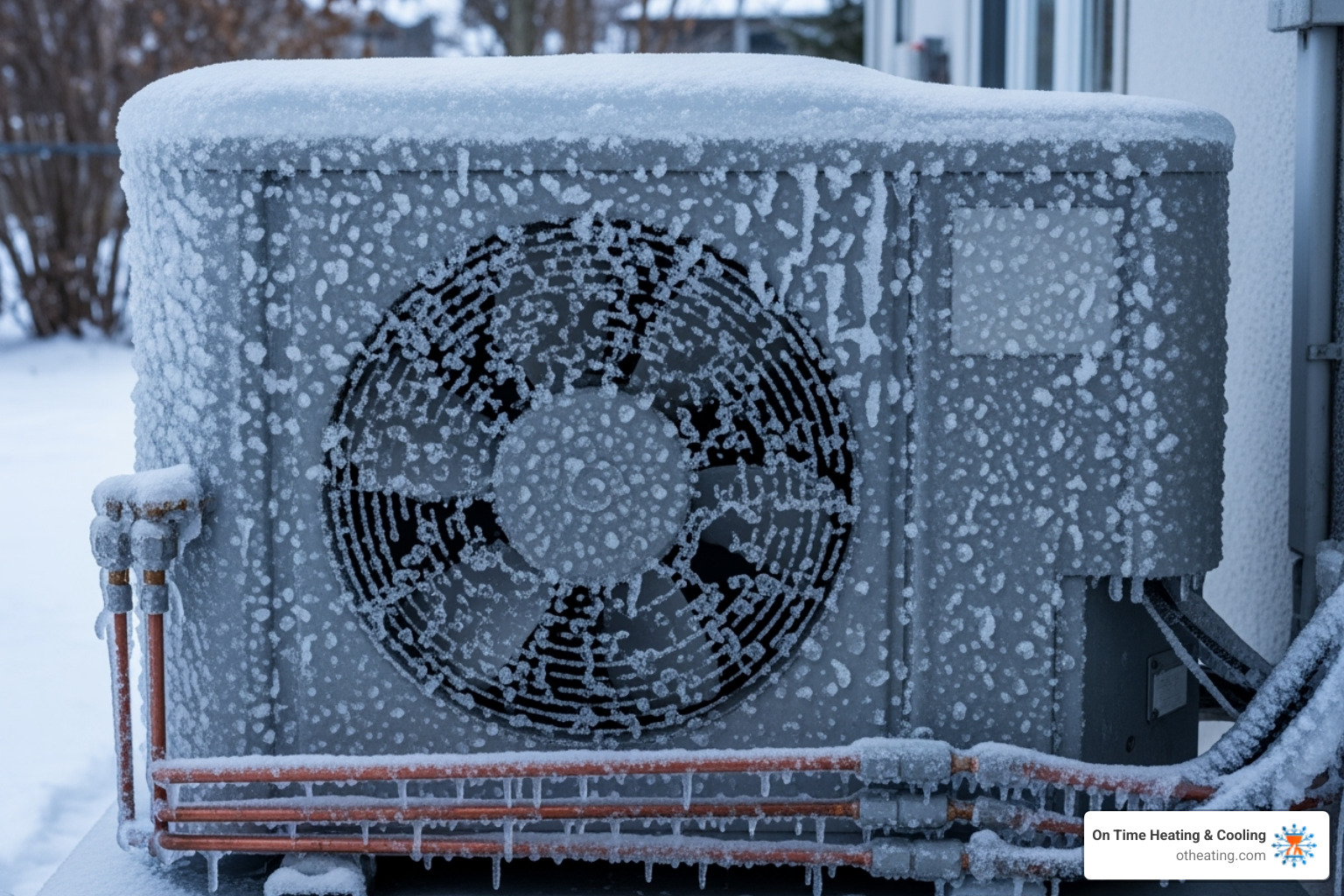
The Big Chill: Troubleshooting and Fixing a Frozen AC Unit
When Your AC Freezes Up: Understanding a Common Summer Problem
AC freezing up is one of the most frustrating problems homeowners face during hot summer days. Despite the irony of an air conditioner getting too cold, this issue affects thousands of homes across Wisconsin every year.
Quick Answer: What Causes AC Freezing Up?
- Blocked airflow - Dirty filters, closed vents, or malfunctioning blower fans (most common)
- Low refrigerant levels - Usually caused by leaks in the system
- Mechanical failures - Stuck contactors, clogged drain lines, or dirty coils
- Environmental factors - Running AC when outdoor temps drop below 60°F
Immediate Steps:
- Turn off your AC at the thermostat
- Switch the fan to "ON" to help thawing
- Wait 1-24 hours for complete defrosting
- Check and replace dirty air filters
One HVAC professional from Texas perfectly captured the summer reality: "One of the most frequent calls I receive in the summer months is 'My AC is frozen, and it's really HOT!! Can you please help?'"
The good news? Many frozen AC problems stem from simple maintenance issues you can prevent. However, some causes like refrigerant leaks require professional diagnosis and repair.
Understanding why your AC freezes up helps you take the right action quickly. Whether it's a simple filter change or a complex refrigerant leak, knowing the difference can save you time, money, and uncomfortable summer nights.
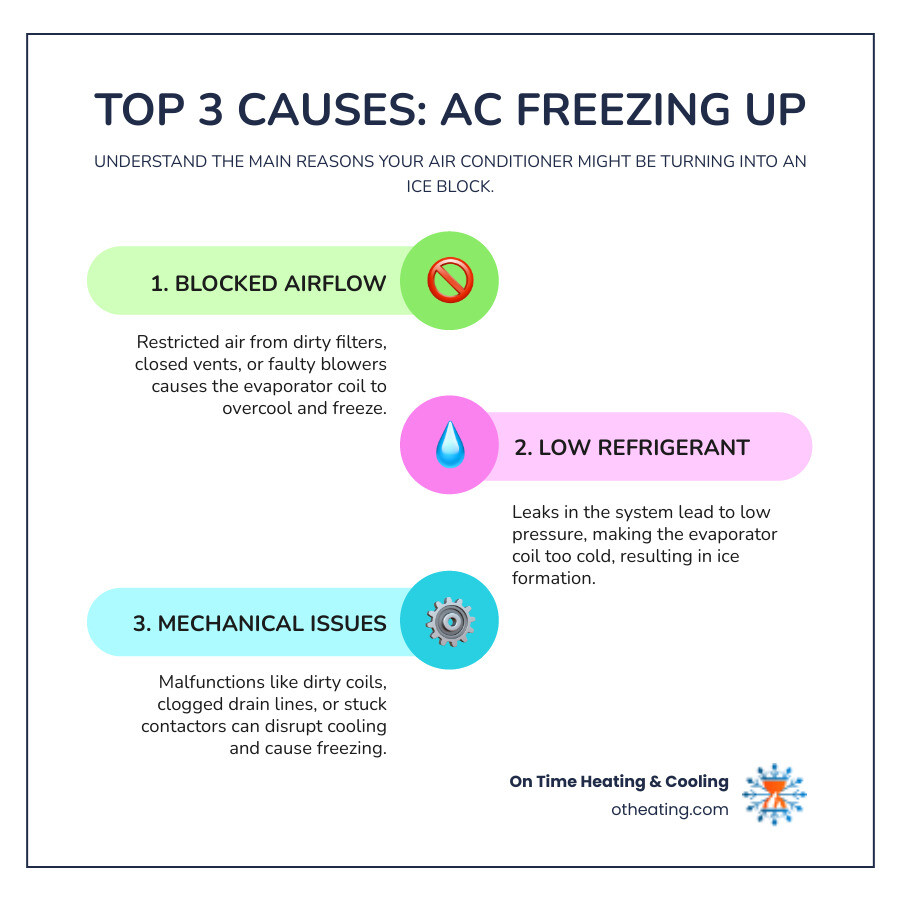
First Steps: What to Do When Your AC Unit is Frozen
Picture this: it's blazing hot outside, you're looking forward to cool relief at home, and instead you find your air conditioner has turned into a winter wonderland. When your AC freezing up becomes reality, don't panic – but do act quickly to prevent costly damage.
Spotting a frozen AC is usually pretty obvious. You'll see ice on the evaporator coil (the indoor unit) or ice on the refrigerant lines running to your outdoor unit. Puddles of water around either unit are another dead giveaway – that's melted ice trying to escape. The most frustrating sign? Warm air blowing from your vents when you desperately need cooling, or sometimes no air at all.
Your first move is crucial: turn off your AC immediately. Set your thermostat to "OFF" for cooling, but here's the key part – switch your fan setting to "ON." This keeps the blower fan running, circulating warm indoor air over those frozen coils to help them thaw naturally. Think of it as giving your AC a gentle warm hug to melt away its icy troubles.
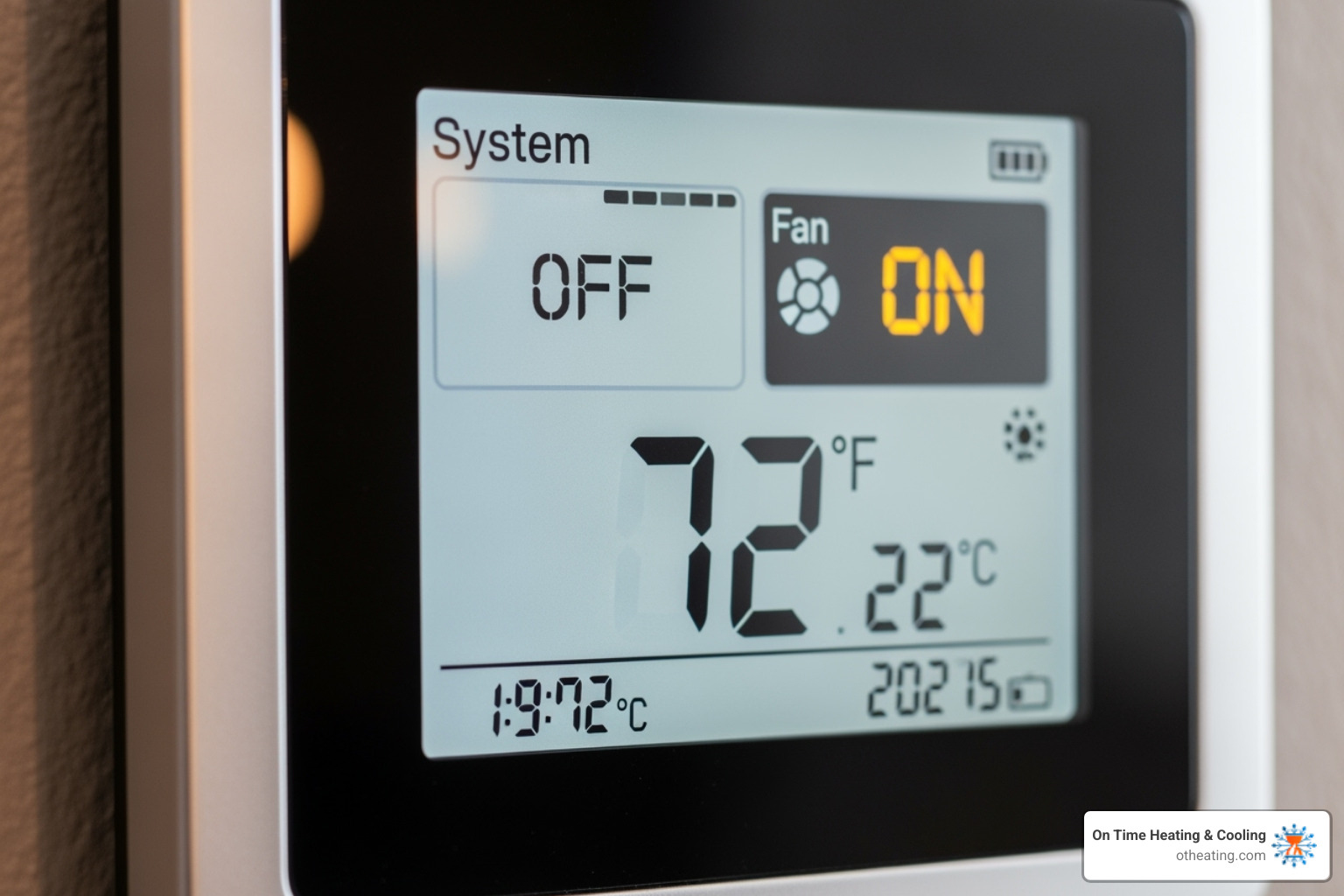
How to Safely Defrost Your System
Safety first! Head to your electrical panel and turn off the circuit breaker for your HVAC system. This prevents the AC from accidentally restarting while it's still frozen, which could damage the compressor – and trust us, that's a repair bill nobody wants to see.
Now comes the hardest part: waiting. Allow 1-24 hours for complete thawing depending on how much ice has built up. We know it's hot and uncomfortable, but patience saves money here. While you wait, place towels around the units to catch melting water – your floors will thank you later.
Here's what not to do: don't grab a hammer, screwdriver, or hair dryer to speed things up. Never chip ice away manually – those delicate coil fins and refrigerant lines cost hundreds of dollars to replace. The potential for damage from DIY ice removal far outweighs the few hours you might save.
Check for complete defrosting before even thinking about restarting your system. Every bit of ice must be gone, or you'll just refreeze everything and potentially damage your compressor. Once fully thawed, you can start investigating what caused the freeze-up in the first place.
A frozen AC that's ignored today becomes a much bigger – and more expensive – problem tomorrow. Taking these careful first steps protects your investment and gets you back to comfortable cooling faster.
Why is My AC Freezing Up? Uncovering the Root Causes
When your AC freezing up becomes a problem, it might seem like your cooling system has gotten a little too enthusiastic about its job. After all, you wanted cool air, not an ice sculpture in your backyard! But understanding why this happens requires a peek behind the curtain at how your air conditioner actually works.
Your AC is essentially a heat-moving machine. It doesn't create cold air – instead, it absorbs heat from inside your home and dumps it outside. This magic happens through a refrigerant that constantly cycles between liquid and gas states, moving through different pressure zones in your system.
The star of this show is your evaporator coil, tucked away in your indoor unit. As warm air from your home flows over this coil, the liquid refrigerant inside absorbs that heat and transforms into a low-pressure gas. This gas then travels to your outdoor unit to release all that captured heat. When everything's working smoothly, you get perfectly conditioned air.
But when something disrupts this delicate dance, your evaporator coil can get too cold – so cold that moisture in the air freezes right onto its surface. The science behind this involves the Joule-Thomson effect, which explains how expanding gases (like your refrigerant) naturally drop in temperature.
The root causes of AC freezing up generally fall into three main camps: insufficient airflow, low refrigerant levels, and various mechanical failures. There are also environmental factors like running your AC when outdoor temperatures drop below 60°F that can trigger freezing. Understanding these causes is your first step toward getting back to comfortable temperatures.
The Airflow Problem: The Most Common Culprit
Here's the thing about AC freezing up – most of the time, it comes down to something surprisingly simple: your system can't breathe properly. When air can't flow freely over that evaporator coil, the coil can't absorb enough heat from your home. Without that heat exchange, the refrigerant gets way too cold, and before you know it, you've got an ice problem.
Think of it like trying to warm your hands by a campfire while wearing thick gloves – the heat transfer just doesn't work right.
Clogged air filters are the biggest troublemaker here. When your filter gets packed with dust, pet hair, and all the stuff floating around your home, it becomes like a wall blocking airflow. Your poor evaporator coil ends up starving for warm air, gets too cold, and starts collecting ice instead of removing heat. We recommend checking your filter monthly and swapping it out every 1 to 3 months, depending on how busy your household is and whether you have pets.
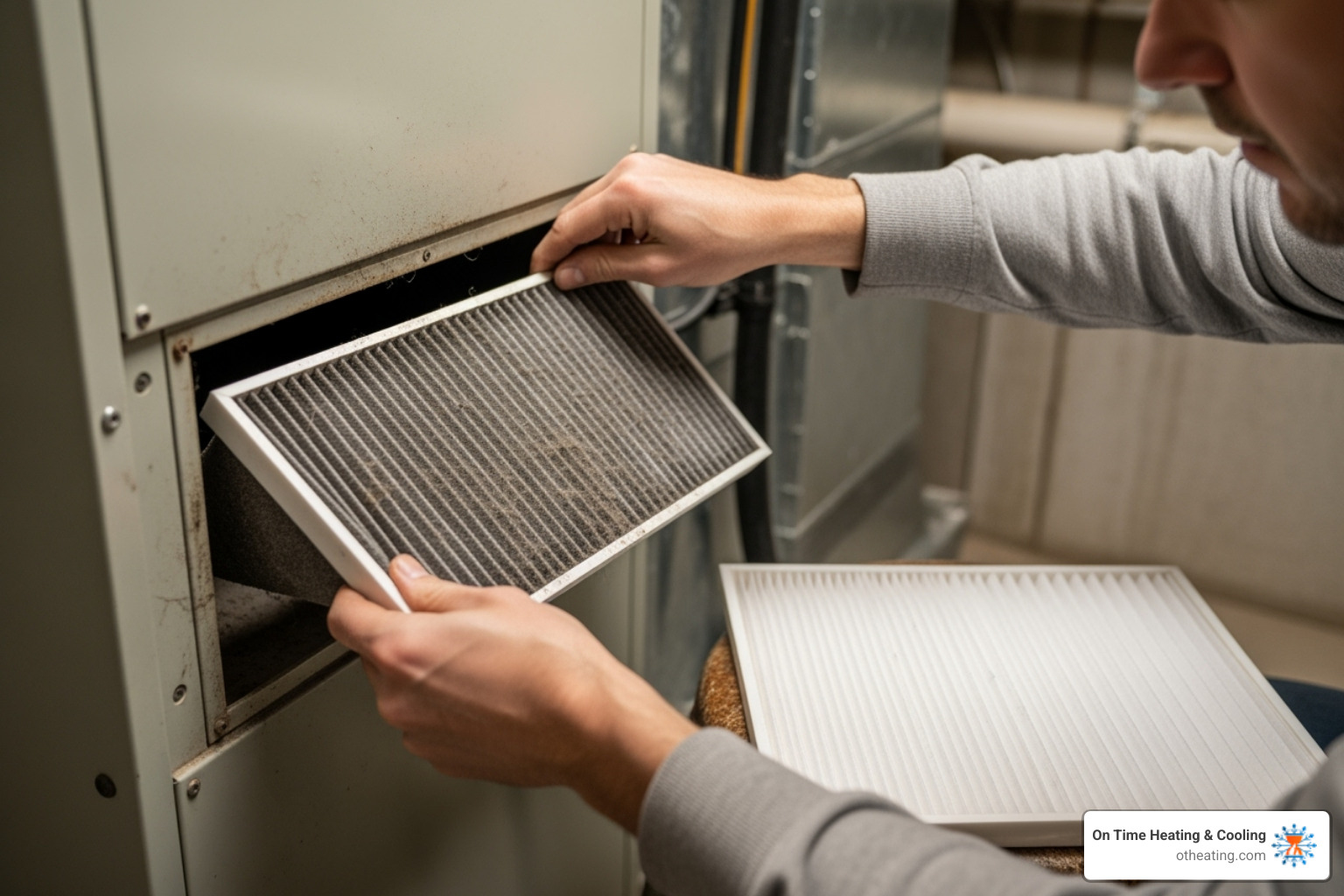
Blocked vents and registers create similar problems. We've all been guilty of letting furniture drift in front of a vent or having curtains cover return air grilles. But when you block these pathways, you're essentially choking your system. The AC can't pull in enough warm air or distribute cool air properly, which throws off the whole heat exchange process.
Malfunctioning blower fans can really throw a wrench in things too. This fan is responsible for pushing air across your evaporator coil and throughout your ductwork. When it's not working right – maybe it's running too slowly or making strange noises – your system loses its ability to move air effectively. You can find helpful guidance on how to change your AC's air filter to rule out filter issues first.
No air from vents, weak airflow even on high settings, or rattling and humming noises from your indoor unit are all signs your blower fan might be struggling.
Even with a clean filter, your evaporator coil itself can get dirty over time. Dust and grime build up on the coil's surface, acting like an insulating blanket that prevents proper heat absorption. This usually requires professional cleaning to address properly.
Less commonly, collapsed air ducts can create airflow restrictions. If your ductwork gets damaged, disconnected, or crushed, it can significantly reduce the air reaching your evaporator coil, leading to that same freezing problem.
The Refrigerant Riddle: Why Low Levels Cause an AC Freezing Up
While airflow issues are the usual suspects, low refrigerant levels represent a more serious problem when your AC freezing up. Here's the key thing to understand: your air conditioner's refrigerant operates in a sealed system. It doesn't get "used up" like gasoline in your car. If your refrigerant is low, it means you have a leak somewhere.
When refrigerant levels drop, the pressure in your system drops too. This causes the remaining refrigerant to expand more than it should when it reaches your evaporator coil. That over-expansion creates an even bigger temperature drop, making the coil so cold that moisture in the air instantly freezes on contact.
You might notice hissing sounds coming from your unit or oily residue around the refrigerant lines – both signs of a potential leak. If someone "recharged" your system last year and you're dealing with freezing again, that's a strong hint the original leak never got properly fixed.
It's important to know that it's illegal to vent refrigerants in the US due to environmental regulations. Only certified HVAC technicians can safely handle refrigerant work, including professional leak detection and proper repairs.
Other Mechanical and Environmental Factors
Several other factors can contribute to your AC freezing up beyond the main culprits.
A clogged condensate drain line might not seem related, but it can definitely cause problems. As your AC cools your home, it removes moisture from the air. This water normally drains away through a small line, but when that line gets blocked with algae or debris, water can back up and pool around your evaporator coil, where it can freeze.
Stuck compressor contactors create a different kind of problem. These electrical switches tell your compressor when to turn on and off. If one gets stuck in the "on" position, your compressor runs continuously, which can lead to excessive cooling and pressure drops that cause freezing.
Running your AC below 60°F outside might seem harmless, but most air conditioners aren't designed to operate efficiently in cool weather. When outdoor temperatures drop too low, system pressures can become unstable, leading to evaporator coil freezing.
Thermostat malfunctions can also play a role. If your thermostat isn't reading temperatures correctly or gets set too low for extended periods, it might cause your AC to run longer and colder than necessary, increasing freezing risk.
| Cause of Freezing | DIY Fixes | When to Call a Pro |
|---|---|---|
| Clogged Air Filter | Check and replace filter | If freezing persists after filter change |
| Blocked Vents | Clear obstructions | If ductwork issues are suspected |
| Dirty Evaporator Coil | Limited options | For thorough cleaning, especially if heavily soiled |
| Low Refrigerant Levels | None safe/legal | Always for leak detection and recharge |
| Malfunctioning Blower Fan | Check if fan is running | For diagnosis and repair/replacement of motor |
| Clogged Condensate Line | Attempt to flush with vinegar/water | If clog is persistent or inaccessible |
| Stuck Compressor Contactor | None | For diagnosis and replacement |
| Running AC Below 60°F | Turn off AC, use alternative cooling | If unit still freezes in appropriate temperatures |
| Thermostat Malfunction | Check settings, replace batteries | For calibration, repair, or replacement |
Understanding these root causes helps you know when you can tackle a problem yourself and when it's time to call in professional help. The good news is that many freezing issues stem from simple maintenance problems that are totally preventable with regular care.
DIY Prevention and When to Call a Professional
Picture this: It's the hottest day of summer, and instead of dealing with a frozen AC unit, you're relaxing in perfectly conditioned comfort. That dream becomes reality when you stay ahead of the problem with simple, regular maintenance.
Think of your HVAC system like your car – it needs regular check-ups to run smoothly. The difference is that most AC maintenance tasks are much easier than changing your oil! And just like ignoring that strange noise in your engine, ignoring AC freezing up issues can lead to catastrophic (and expensive) problems.
When an AC unit freezes repeatedly, it puts tremendous stress on the compressor – essentially the heart of your cooling system. A failing compressor often means you're looking at a repair bill that rivals the cost of a brand-new system. It's like having a heart attack when all you needed was to eat better and exercise a little. Prevention really is the best medicine.
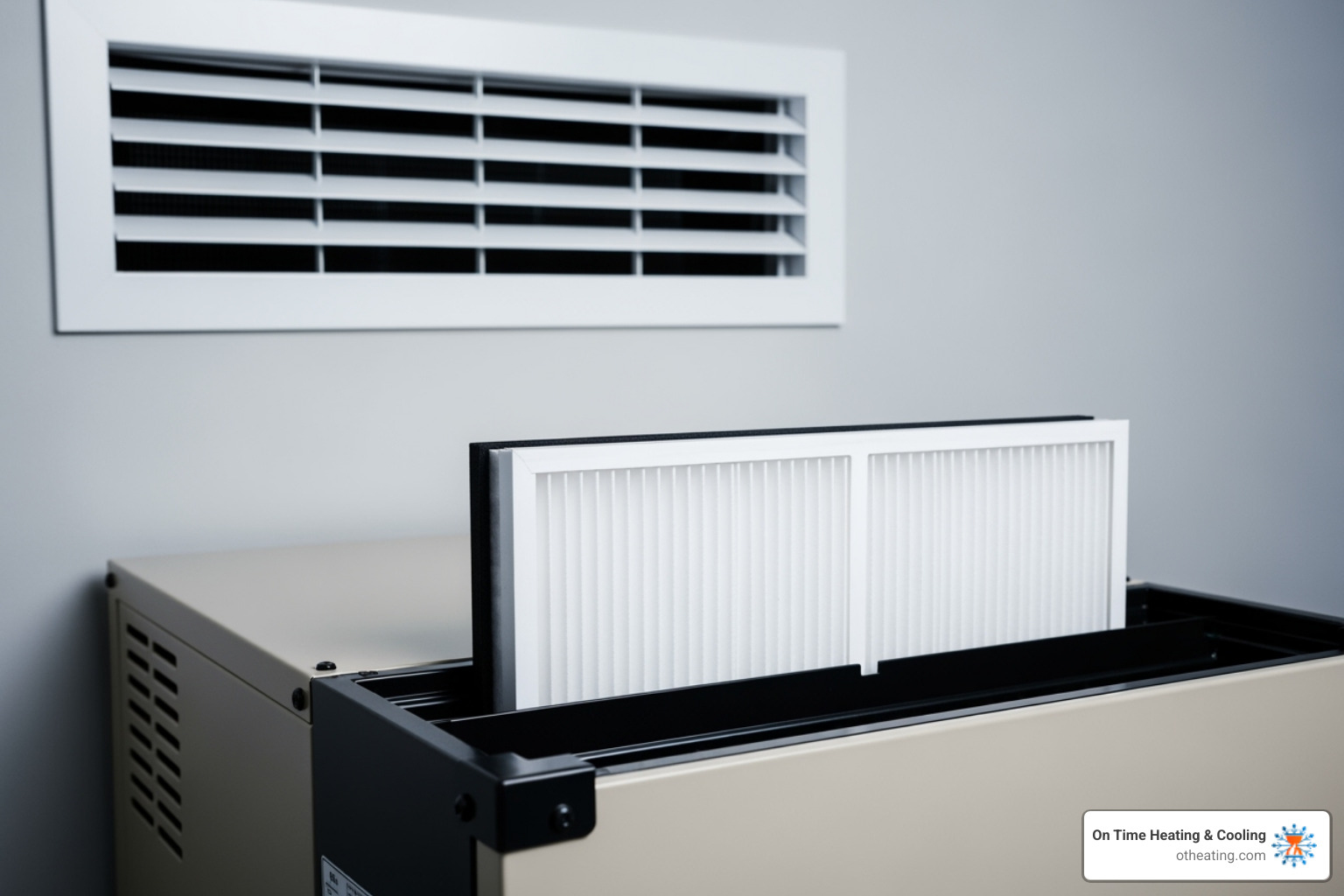
Simple Maintenance to Prevent Your AC Freezing Up
The best part about preventing AC freezing up? Most of the work involves simple tasks you can easily handle yourself. We're talking about maintenance that takes minutes, not hours, and costs dollars, not hundreds.
Changing your air filter regularly tops our prevention list every time. It's the single most powerful thing you can do to keep your AC running smoothly. Check your filter monthly – yes, monthly – and replace it every 1 to 3 months depending on your household. Homes with pets, kids, or allergy sufferers might need fresh filters even more frequently. Some families go through 6 to 12 filters per year, and that's perfectly normal!
Keeping your vents clear is another simple but crucial step. Walk through your home and make sure supply and return vents aren't blocked by furniture, curtains, or that pile of laundry you've been meaning to put away. Good airflow prevents most freezing problems before they start.
Your outdoor unit needs breathing room too. Clear away leaves, grass clippings, and any plants that have grown too close to the condenser. Think of it as giving your AC some personal space – it performs better when it's not crowded.
Don't forget about your condensate drain line either. This little pipe carries away moisture from your system, but it can get clogged with algae and debris. A simple flush with distilled vinegar and water every few months keeps it flowing freely. The Energy.gov maintenance tips provide excellent guidance for these routine tasks.
Signs You Need to Call an HVAC Technician
Sometimes, despite your best efforts, problems develop that require professional expertise. At On Time Heating & Cooling, we've seen it all, and we know exactly when DIY maintenance reaches its limits.
Recurring freezing after you've thawed the unit and performed basic maintenance is a red flag that something deeper is wrong. If you've changed the filter, cleared the vents, and your AC still freezes up within days or weeks, you're likely dealing with a refrigerant leak or mechanical failure that needs professional diagnosis.
Any suspected refrigerant leak requires immediate professional attention. Those hissing sounds, oily residues around the lines, or the fact that your system needed a "recharge" last year all point to leaks. Refrigerant handling isn't just complicated – it's regulated by federal law and requires special certification and equipment.
Strange noises from your system tell a story, and it's usually not a happy one. Grinding, screeching, banging, or rattling sounds often indicate failing motors, loose components, or worn bearings. These problems get worse quickly and can cause extensive damage if ignored.
Electrical problems like repeatedly tripped breakers, visible damage to wiring, or an AC that simply won't turn back on after thawing need professional attention immediately. Electrical issues can be dangerous and should never be DIY projects.
Short-cycling – when your AC turns on and off frequently without completing full cooling cycles – wastes energy and indicates underlying problems. This could be anything from a malfunctioning thermostat to low refrigerant levels.
Our team at On Time Heating & Cooling combines old-school customer service values with modern diagnostic tools and techniques. When you call us, you're not just getting a repair – you're getting partners who care about keeping your family comfortable all season long.
Conclusion
When your AC freezing up becomes a summer reality, you're not alone in this chilly predicament. The good news is that most frozen AC problems have straightforward solutions once you understand what's happening behind the scenes.
The overwhelming majority of these icy situations come down to insufficient airflow - often something as simple as a clogged air filter that's been working overtime to catch dust, pet hair, and all the other things floating around your home. Low refrigerant levels from system leaks and various mechanical issues like stuck contactors or clogged drain lines round out the most common culprits.
Here's your game plan when you find ice where it shouldn't be: thaw first, troubleshoot second. Turn off the cooling function, switch your fan to "ON," and then practice the fine art of patience. We know it's tempting to grab an ice pick or hair dryer when it's sweltering outside, but resist that urge! Let the system defrost completely - sometimes up to 24 hours - before you restart it or start investigating. Your compressor will thank you, and so will your wallet.
Some prevention and basic troubleshooting absolutely fall within the DIY wheelhouse. Changing filters regularly, keeping vents clear, and maintaining your outdoor unit can prevent most freezing episodes. But when you're dealing with refrigerant leaks, persistent freezing, or mechanical failures, it's time to call in the professionals.
That's where we come in. At On Time Heating & Cooling, we've built our reputation on showing up when we say we will and getting your system back to its happy, cooling self. We serve homeowners throughout Menomonee Falls and the surrounding communities with that perfect blend of old-school customer service and modern HVAC expertise.
Don't let a frozen AC turn your summer into a sweaty nightmare. Schedule your AC service in Sussex, WI today, and let our team restore the cool comfort your home deserves!

%202%20(1).svg)
.svg)

.svg)
.svg)
.svg)

.svg)